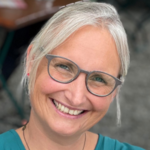Dr. Melanie Hackenfort
- seit Januar 2023 wiss. Mitarbeiterin im Projekt "Ökosoziale Transformation konkret - Laudato si' und Fratelli tutti in Forschung und Praxis" (37,5%)
- seit Dezember 2022 Ausbildung zur systemischen Beraterin (IFW München)
- Lehrbeauftragte an der Universität Passau (Wintersemester 2019; Sommersemester 2021; Wintersemester 2021/22)
- Mai 2019 - April 2020 Wiss. Mitarbeiterin der Zentralen Beauftragen für Gleichstellung der Universität Koblenz-Landau (15 h).
- seit Oktober 2018 Post-Doc am Institut für Kulturwissenschaft (Seminar Ethnologie) (50%)
- Juli 2010 - Oktober 2018 Promotion in Kulturwissenschaft (Schwerpunkt Ethnologie), Universität Koblenz-Landau, Campus Koblenz
- Elternzeit Januar 2015 - April 2016
- Oktober 2014 - Oktober 2021 Stellvertretende Sprecherin der AG Visuelle Anthropologie der Deutschen Gesellschaft für Sozial- und Kulturanthropologie
- Elternzeit Mai 2012 - Juli 2013
- seit April 2009 wissenschaftliche Mitarbeiterin am Institut für Kulturwissenschaft der Universität Koblenz-Landau, Campus Koblenz
- 2000 bis 2001 Praktikum bei den Kolping Jugendgemeinschaftsdiensten in Köln
- 1997 bis 2000 Ausbildung zur staatlich geprüften kaufmännischen Assistentin für Fremdsprachen in Coesfeld
- Kulturelle Dimension des Klimawandels: Nachhaltiges Handeln, ökosoziale Transformation
- Soziale Praxistheorie, Materielle Kulturforschung, Soziale Ästhetik
- Ethnografische Feldforschung / Teilnehmende Beobachtung, Systemanalyse
Umsiedlungsprojekt auf den Philippinen
Forschungsstandort: Lapu-Lapu City (Mactan Island, Philippinen)
Feldforschung: Mai 2011 bis Januar 2012
Thema der Dissertation: "Changing Lives through Relocation - Ethnography of a Socialized Housing Project in the Philippines"
Abschluss der Promotion: 18.10.2018
Abstract:
Changing lives through relocation - This is the vision of a socialized housing project in the Philippines which is subject of this dissertation. It is a polyphonic ethnography that investigates the transition process from an informal, marginalized, self-organized lifestyle in squatter areas and dumpsite settlements to an institutionalized and policy-based life in the socialized housing project. The transition process is analyzed from a material cultural perspective taking into account selected aesthetic theories. With this approach, the dissertation aims to contribute to the study of the aesthetic dimension of everyday life from an ethnographic perspective. Aesthetics are applied on three levels: (1) On the theoretical level, the concepts of social aesthetics and atmospheres enrich the analysis of the interrelation between the residents and their new house in the socialized housing project. (2) On the methodological level, the relevance of aesthetic experiences for the ethnographic knowledge process are discussed. And (3) on the descriptive level, selected and thematically relevant sensory and aesthetic experiences of the researcher inform the ethnographic account in the form of memoirs. By incorporating aesthetic theories, the dissertation gives a more holistic account of the dynamics active in the transition process. It shows that the change of lifestyle is experienced sensorily through the daily physical engagement with the new material environment, i.e. its specific materiality and infrastructure, its affordances and constraints giving rise to new experiences and needs. In this process, the residents become aware of the differences between the past and present way of life and thus experience the new challenges through their physical being in the new material environment. On the one hand, this evokes a nostalgic attitude towards their previous life, but on the other hand, it also gives form to ideas of a possible future.
Dissertationsschrift, veröffentlicht via OpenAccess. https://kola.opus.hbz-nrw.de/frontdoor/index/index/docId/1743
- WiSe 2004/05 bis WiSe 2008/09 Magisterstudium der Ethnologie und Soziologie an der Albert-Ludwigs-Universität Freiburg
- WiSe 2003/04 bis SoSe 2004 Magisterstudium der Romanistik, Ethnologie und Soziologie an der Westfälischen Wilhelms-Universität Münster
- 2001 bis 2003 Allgemeine Hochschulreife am Overberg-Kolleg in Münster
- seit 2019 (Gründungs-)Mitglied und 2. Vorsitzende des Filmfest Koblenz e.V.
- seit 2018 Mitglied der Initiative Wochen zur Demokratie, Passau (u.a. Organisation und Moderation der Filmreihe Wozu Demokratie)
- seit 2015 (Gründungs-)Mitglied der Kulturwissenschaftlichen Gesellschaft (KWG); Mitarbeit in der Sektion „Materielle Kulturen“
- seit 2014 Mitglied der Deutschen Gesellschaft für Sozial- und Kulturanthropologie
- Mitorganisatorin des Doktoranden-Workshop für ethnographische Forschung
Hackenfort, Melanie (2019): Excerpts from the field. In: Sabangang. PWU’s Academic Journal, Vol. 1, 2019.
Hackenfort, Melanie (2018): Changing Lives through Relocation - Ethnography of a Socialized Housing Project in the Philippines. Universität Koblenz-Landau. Dissertationsschrift, veröffentlicht via OpenAccess.
Hackenfort, Melanie und Steinicke, Marion (2018): Workshop „Auf-Sammeln und Ver- Werten“, 14.–15. Juli 2017, Koblenz. Im Rahmen der Sektion „Materielle Kulturen“, Kulturwissenschaftliche Gesellschaft. In: Kulturwissenschaftliche Zeitung, Band 3, Heft 1, (Oct. 2018), S. 71-73.
Hackenfort, Melanie (2014): Aussicht auf eine Zukunft. Eindrücke aus einer ethnographischen Feldforschung in einem philippinischen Umsiedlungsprojekt. In: Fisch und Vogel. Nachrichten aus christlicher Solidarität mit den Philippinen. Jahresausgabe - Nr. 84, S. 23-26. (http://www.fisch-und-vogel.de/printarchiv/nr-84/#page/23)
Hackenfort, Melanie (2008): Minangkabau - Im Land der Frauen. In: Ralf Baumeister (Hg.) 2008: Abgehoben – 6000 Jahre Pfahlbauten in Europa und Südostasien. Begleitband zur Sonderausstellung. Federseemuseum, Bad Buchau. Bad Schussenried: Vebu Druck, S.30-37
Hackenfort, Melanie (2008): Sa´dan Toraja - Menschen des Nordens. In: Ralf Baumeister (Hg.) 2008: Abgehoben – 6000 Jahre Pfahlbauten in Europa und Südostasien. Begleitband zur Sonderausstellung. Federseemuseum, Bad Buchau. Bad Schussenried: Vebu Druck, S.50-61.



